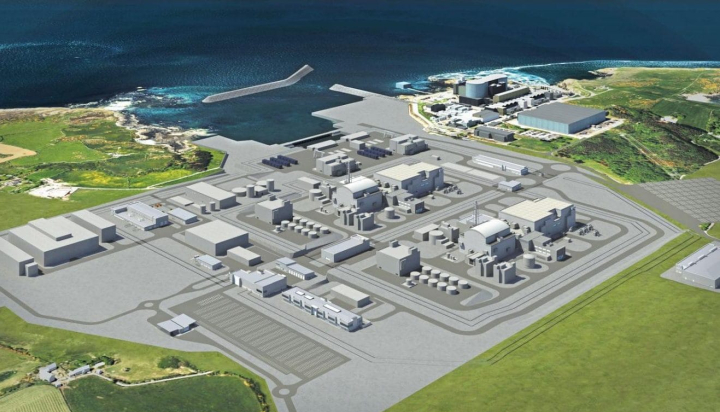Hitachi has pulled out of the troubled Wylfa Newydd nuclear project in Wales, citing the changed investment environment caused by COVID-19.
The company made the decision to end its business operations on the £16 billion UK nuclear power station construction project – known as the Horizon Project – which would have seen two Advanced Boiling Water Reactor (ABWR) nuclear units with a total capacity of 2.9GW built on Anglesey, just off the coast of north Wales.
An ‘utterly predictable’ move
The Japanese conglomerate acquired Horizon Nuclear Power in November 2012, taking on the project, which was intended aid the UK’s decarbonisation by securing new nuclear baseload energy generation.
But in January 2019, Hitachi suspended the project – which would have generated 6% of the UK’s energy needs – because further time was needed to decide on a financing structure for the project.
Today (16 September), the project was officially abandoned, with the company issuing a statement that read: “Hitachi made this decision given that 20 months have passed since the suspension, and the investment environment has become increasingly severe due to the impact of COVID-19.”
Many have deemed the news unsurprising given the suspension and additional challenges caused by the impact of the coronavirus pandemic. The GMB Union for example, stated it was “utterly predictable” that Hitachi would pull out of the project.
The company will now coordinate with the UK government and relevant organisations over the handling of the ABWR license and planned construction site, which sits next to the Wylfa nuclear station currently undergoing decommissioning having ceased generation at the end of 2015.
Tom Greatrex, chief executive of the Nuclear Industry Association (NIA), said the disappointing announcement underscores the “urgent need for progress on new nuclear projects in the UK” if the country’s net zero by 2050 target is to become a reality.
“It is welcome news that Hitachi and Horizon will co-ordinate with the UK government and other relevant organisations over the handling of sites and possible future options. Wylfa is probably the best site in the UK for new nuclear capacity, and has strong community and stakeholders support on Ynys Mon.
“It is imperative that a way forward is found for the site, to deliver thousands of jobs, hundreds of apprenticeships and millions of pounds of investment into an economic boost for the area while delivering secure, reliable and low carbon power to underpin the UK’s transition to net zero.
Hitachi abandoning the Wylfa project is not expected to have a significant impact on the company’s results, as an impairment loss and other expenses from the project totalling 294.6 billion yen featured in the company’s results for the year ending March 31.
A blow to Wales and a blow to nuclear
While unsurprising, the move will be a blow to the people of Anglesey, given the potential to create thousands of jobs.
Horizon Nuclear Power chief executive Duncan Hawthorne said he understood the announcement would be disappointing to the project’s many supporters and that he would “personally like to thank you for your support throughout our time on this project”.
“In particular I would like to thank our lead host community of Anglesey in Wales, represented by the Isle of Anglesey County Council and Welsh Government, and the key representatives around Oldbury.”
Additionally, it further hampers the UK’s new nuclear power development, with just EDF’s Hinkley C currently under construction. Just one of the UK’s 15 nuclear power plants is expected to still be running in 2035 – EDF’s Sizewell B located in Suffolk – and many argue a stronger response from the government is needed to support new developments.
Justin Bowden, the GMB Union’s national secretary, said the announcement is the “outcome of successive government failures to act decisively around new nuclear, and in particular how it is financed”.
“New nuclear is vital in achieving decarbonisation – especially when teamed up with hydrogen.
“It’s no coincidence that around the world – almost without exception – it’s governments who finance these projects, as they are the lender of last resort when it comes to keeping the lights on.
“The fanciful experiment of trying to get foreign companies or governments to fund our future energy needs leaves most ordinary citizens in this country bewildered.”
The UK’s flagship nuclear project Hinkley Point C has however been plagued with challenges, and as of last year was expected to be more than 15 months late on deliver, and as much as £2.9 billion over its original budget.
But despite economic challenges, nuclear power’s proponents argue it has an important role to play in decarbonising the energy sector.
“The nuclear industry has a bright future in this country: investing in emissions free, reliable and secure nuclear power will cut emissions and create the skilled, long-term jobs we need for a green recovery,” finished the NIA’s Greatrex. “No electricity generation source has saved as much carbon as nuclear power has, while generating skilled, stable and long term employment.
“The government can secure these economic and environmental opportunities for future generations by setting out a clear pathway for new nuclear power in forthcoming policy announcements.”






